Last year, I spent just under a month in New Zealand, and wrote a post about how I spent 2.6k SGD over 26 days. I briefly mentioned my experience WWOOFing in New Zealand so now here’s a full post on it! For those of you who have toyed with the idea of working in NZ for accommodation and food or have thought about working on a farm, read on.
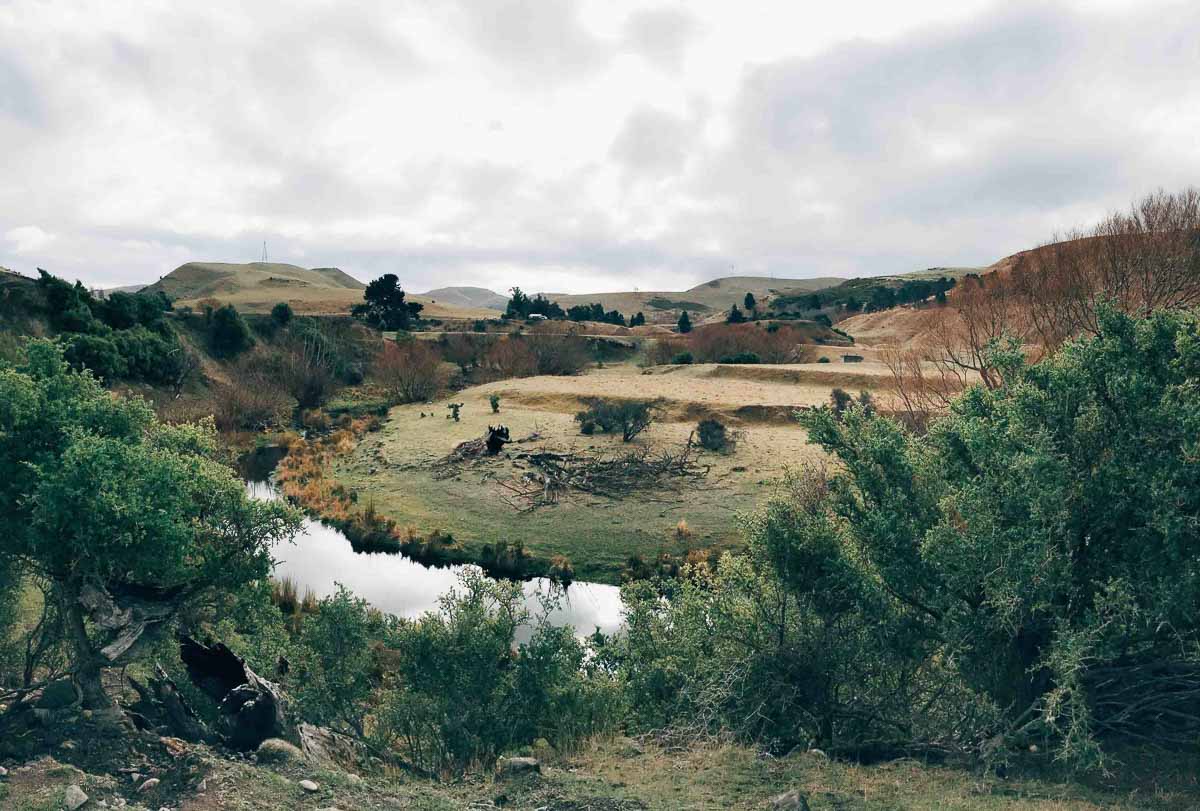
Some background story on my WWOOFing experience in NZ.
My trip to NZ was only 25 days and I spent 11 days wwoofing at 2 different farms. One was near Auckland, Mangawhai, while the other is near Christchurch, in Amberley.
WWOOFing at Mangawhai
I worked for 5 days at the Old Stone House in Mangawhai, which was an incredibly beautiful place to stay at. I would strongly recommend people to wwoof here or even as a honeymoon destination for newly weds’ because it IS THAT AMAZING.
As it was so dark and quiet at night, on days with a clear sky, you can see the sky dotted with stars or if you’re willing to take a short 5-10mins walk to the waterfall, you can even see glowworms. Don’t need to head all the way down to Waitomo just to see glowworms!
Sadly, when we were there, our hosts already had plans to sell the property away. If you’re interested, you can check out the Old Stone House with this promotional video on it.
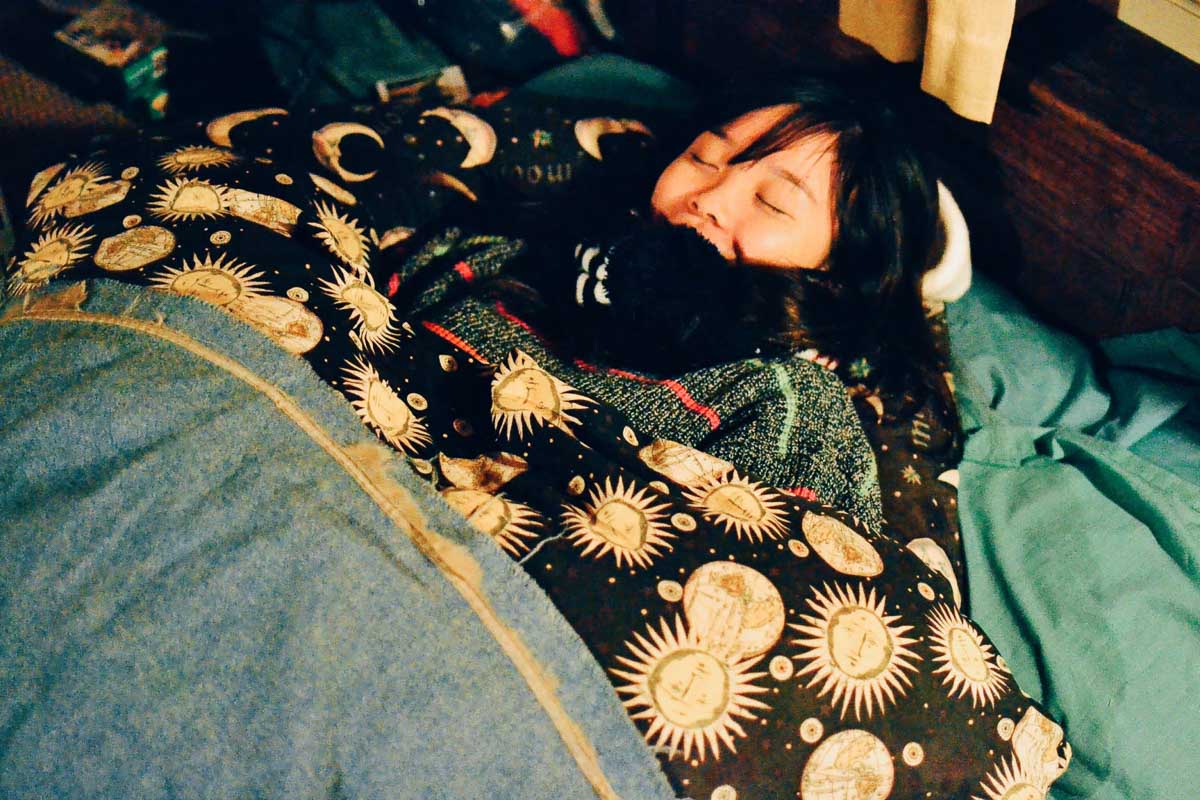
Freezing in 4 layers of clothes and 2 thick blankets on my first night in Mangawhai.
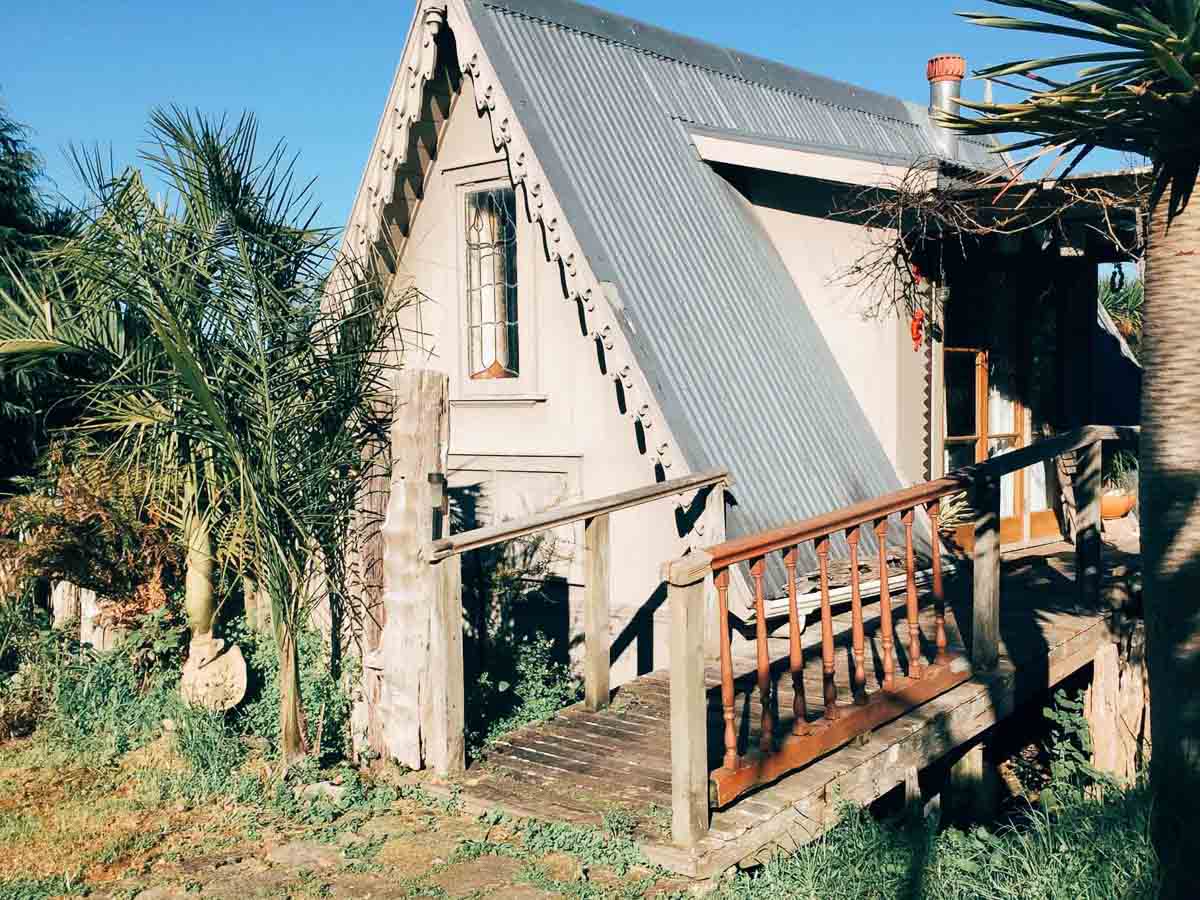 The cottage that was repurposed from an abandoned attic. Amazing or what!
The cottage that was repurposed from an abandoned attic. Amazing or what!
I shared a small cottage less than 5 minutes walk away from the main house with my friend during my stay there. There’s a private bathroom as well as an outdoor shower area. Would totally shower out in the open in the summer!!!
It was a small (it’s quite a big piece of land if you judge it by Singapore standards) organic farm that had a bit of everything, which was fantastic since I love trying out and experiencing new things. They had some cows there, a vegetable garden, chickens and an orchard growing all kinds of fruits and a lot of macadamia nuts.
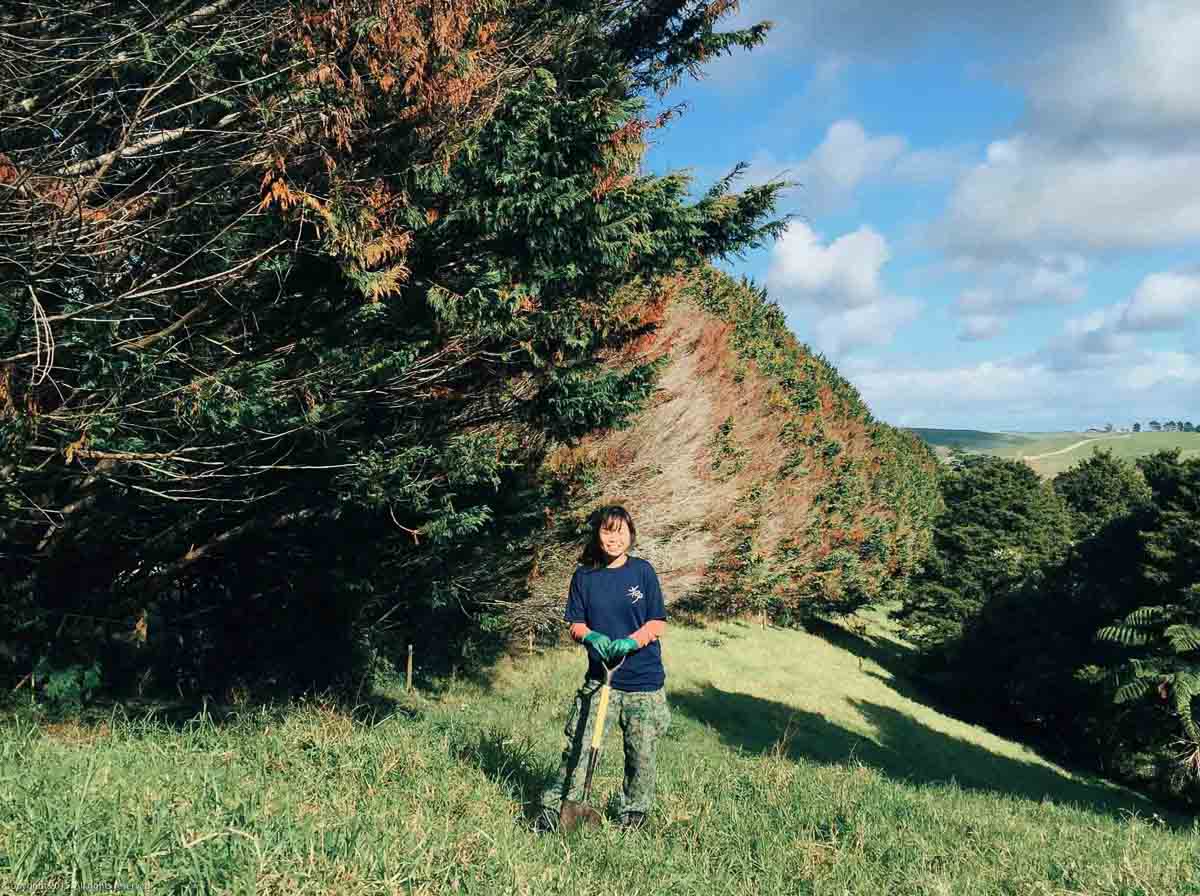
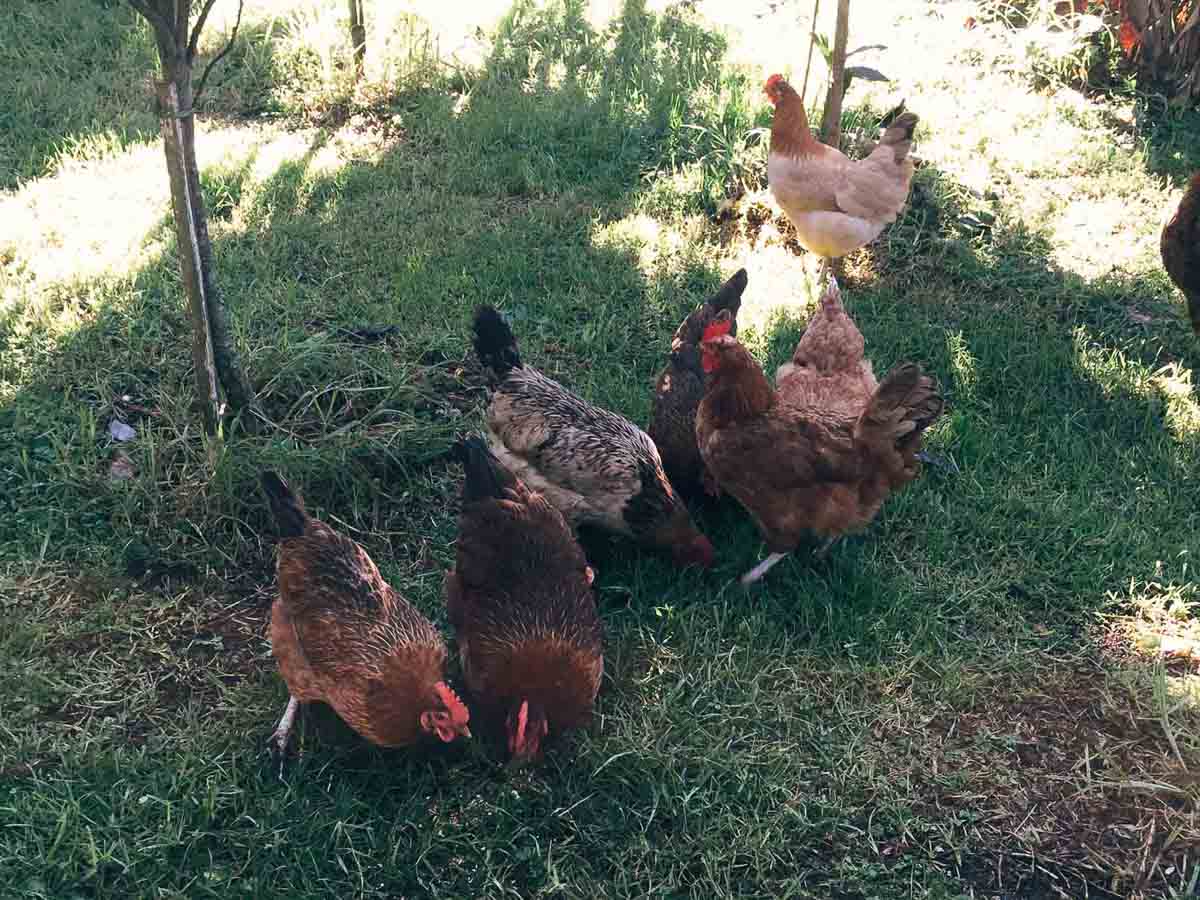 I must say Singapore’s green army pants are great at camouflaging. I can hardly see my legs!
I must say Singapore’s green army pants are great at camouflaging. I can hardly see my legs!
My tasks there included, pruning the overgrowth near the electric fences in order to keep the cows in, weighing macadamia nuts, seeding, weeding, cleaning the house and other miscellaneous work that my host required help with.
WOOFing at Amberley
As for my second farm at Amberley, it was a small vineyard where they make their own wine, though there were a few cows and sheeps as well but they were more like pets to them, not so much for monetization purposes.
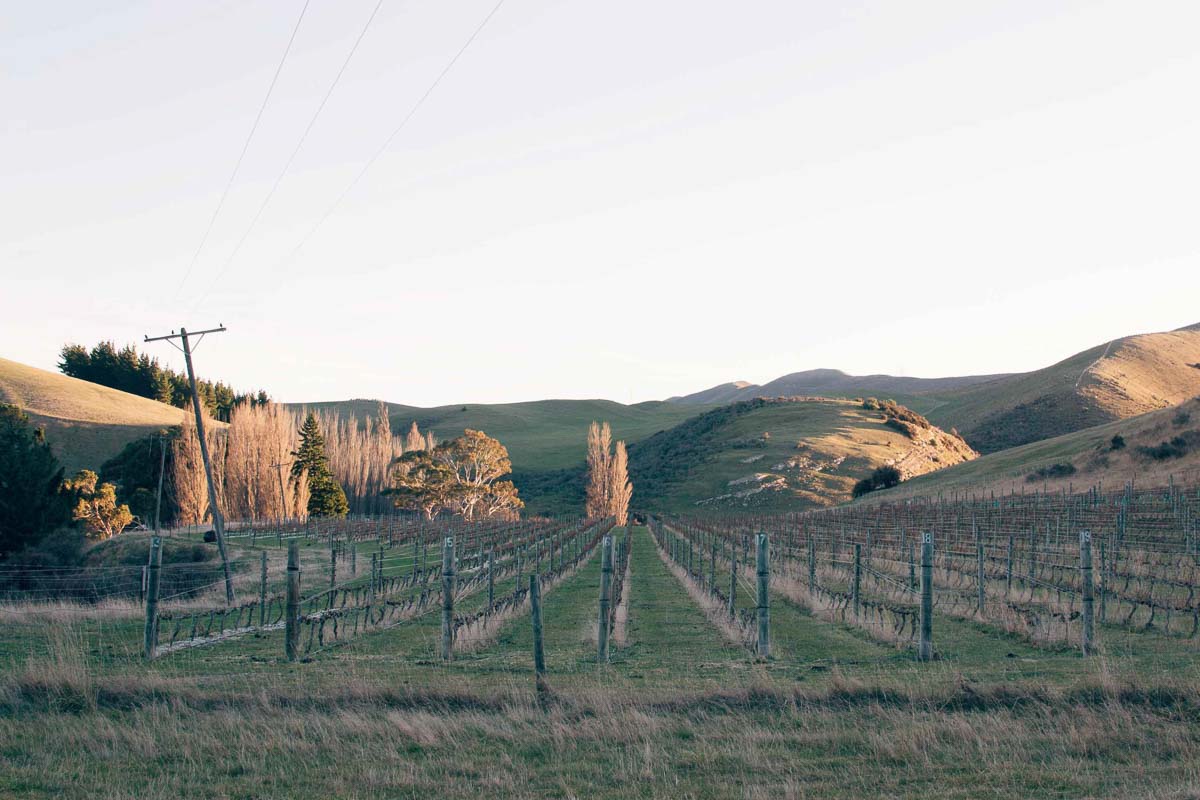 The vineyard that I wwoofed at.
The vineyard that I wwoofed at.
So as it was winter at the time I went, the vineyard looks almost barren, what we were tasked to do was to prune all the rows of vines. Then gather the sticks together into a pile. For my second farm, that was my main job and the reason the hosts needed wwoofers for. So that was basically what I did throughout my 5/6 days there. Oh, plus some scooping of cow dung.
Depending on your hosts, the type of farm you’re at and depending on your requests as well, your job scope varies.
Both our hosts did not tell us what we were supposed to be doing at their farm until we were there. I suppose most of them don’t have a clear agenda or “jobscope” and you can’t really know what you’ll be doing until you reach there yourself. So what I would advice is to just keep an open mind and make the best out of what comes in your way.
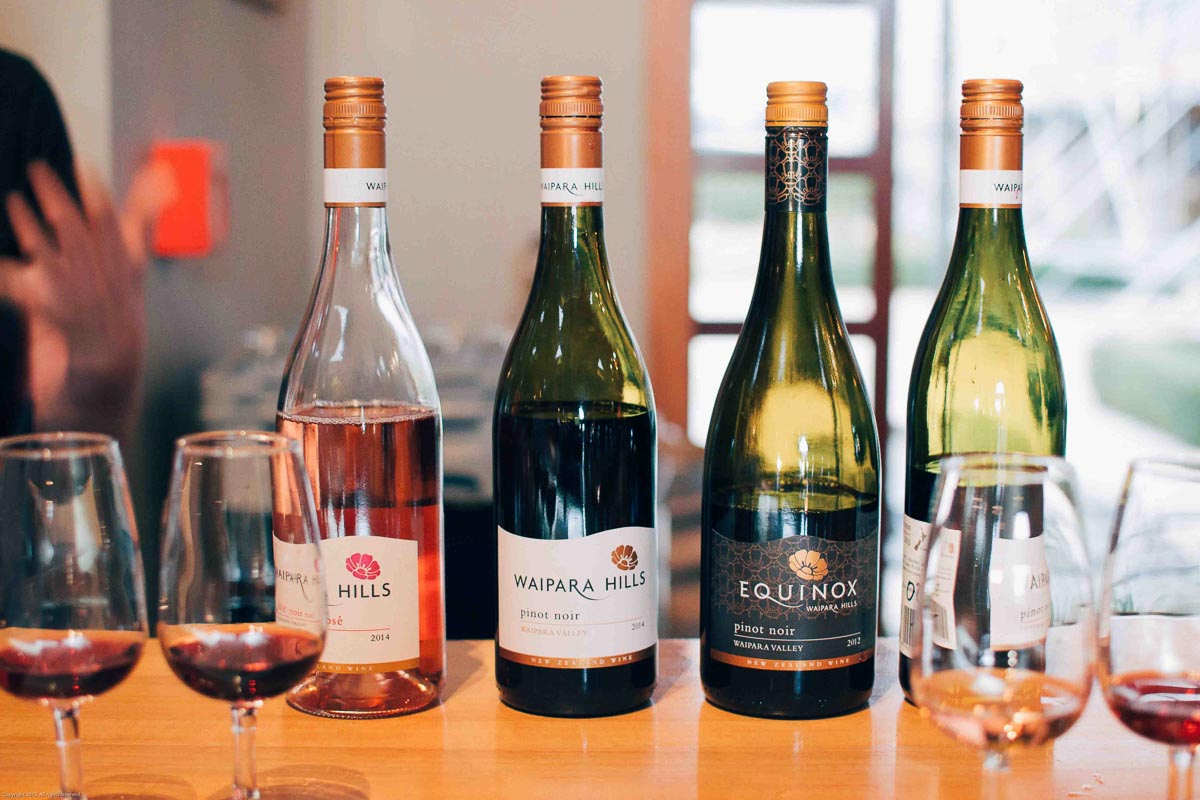 Our hostess in Amberley was so kind to bring us wine tasting at Waipara Hills winery, which really taught us so much about wine. Am I cultured now?
Our hostess in Amberley was so kind to bring us wine tasting at Waipara Hills winery, which really taught us so much about wine. Am I cultured now?
I thoroughly enjoyed both wwoofing experiences though they were completely different in terms of the farm and the type of work we were expected to do. Both hosts were incredibly warm and kind, who were so generous in sharing what they knew about farming or winemaking with us.
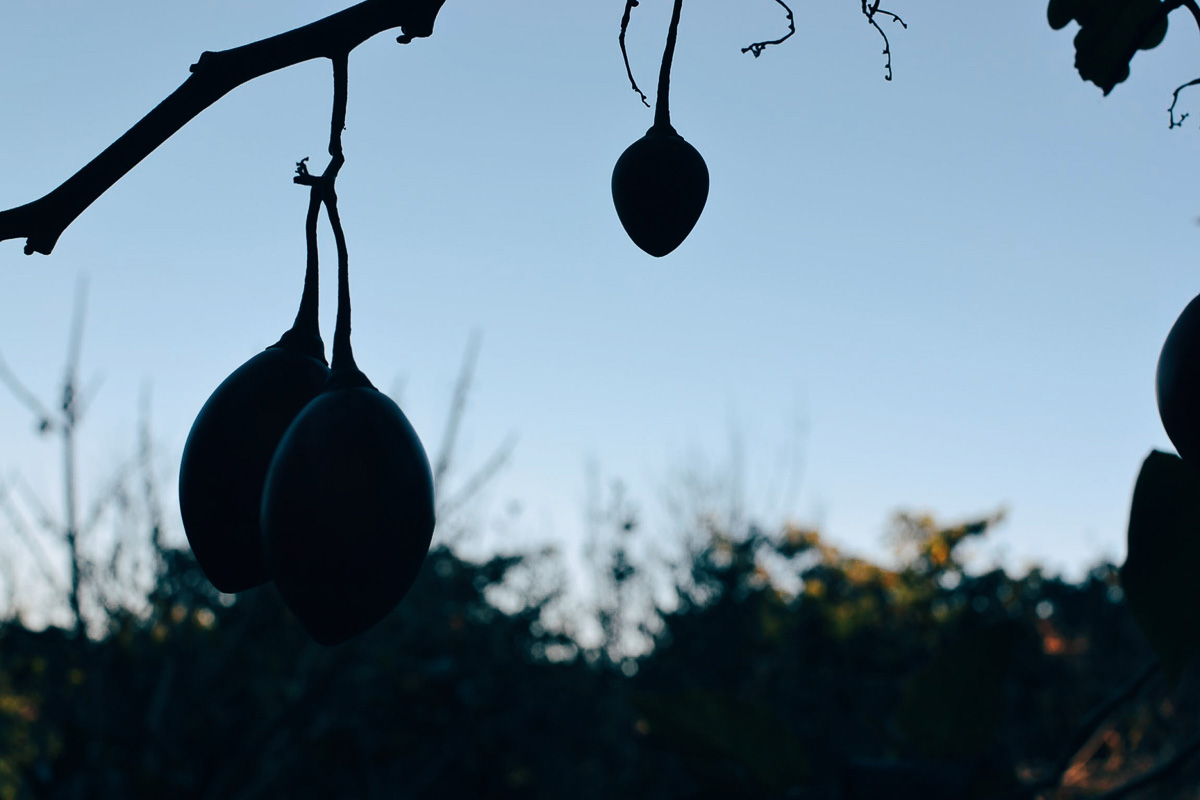
However, it may be better and easier to find jobs in the summer according to the hosts as there are a lot more jobs and help needed during summer since it’s harvest season. It’s quieter in winter and sometimes it’s really quite cold to work outside early in the morning. Personally, I prefer the cold and that’s precisely the reason why I chose to travel to NZ in winter but it’s really up to you. I believe both seasons will give you an entirely different yet equally amazing experience.
What is WWOOF?
WWOOF is an acronym for Willing Workers on Organic Farms.
As the name tells, you work willingly (Volunteer!) on a farm! It’s not a paid job so you don’t get paid for your services but in exchange you get to live with them and they provide you with food for free. Save on food and accommodation plus you get to experience and live with a local host! WWOOFing is available in many countries and NZ is just one of them. You can check out WWOOF International and check out the places you are interested in! Do note that my tips here are based on my experience with WWOOFing in NZ so it might be a little different in different parts of the word!
Why WWOOF if you can get paid work?
It really depends on what you’re looking for. Some questions you can ask yourself:
Are you in it purely to save cost and lower your expenses?
Or are you in it for the farm experience?
How long is your trip? 3 weeks? 1 year? Undecided?
What kind of work are you looking for?
I decided to go with WWOOFing instead as most paid jobs require a contract or agreement of some sort. My trip to NZ was only a month and since most paid work will require you to work a few weeks at least, I do not have the luxury of time to spend it all at one place.
What I wanted most out of it was the experience of living and working on a farm and hopefully cutting down on cost. I’ve always had this mini dream of being a farmer (hahaha!).
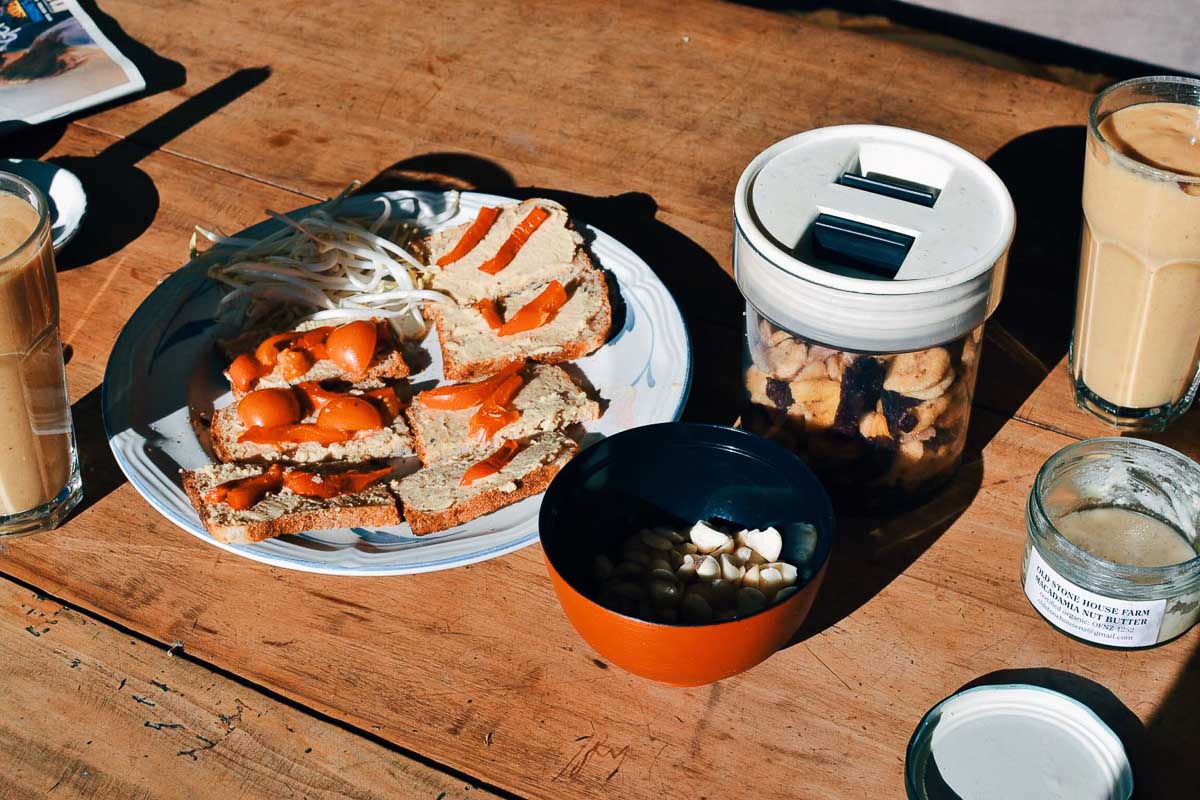 Some wholegrain bread with hummus, macadamia nut butter, raw bean sprout, bell peppers and tomatoes.
Some wholegrain bread with hummus, macadamia nut butter, raw bean sprout, bell peppers and tomatoes.
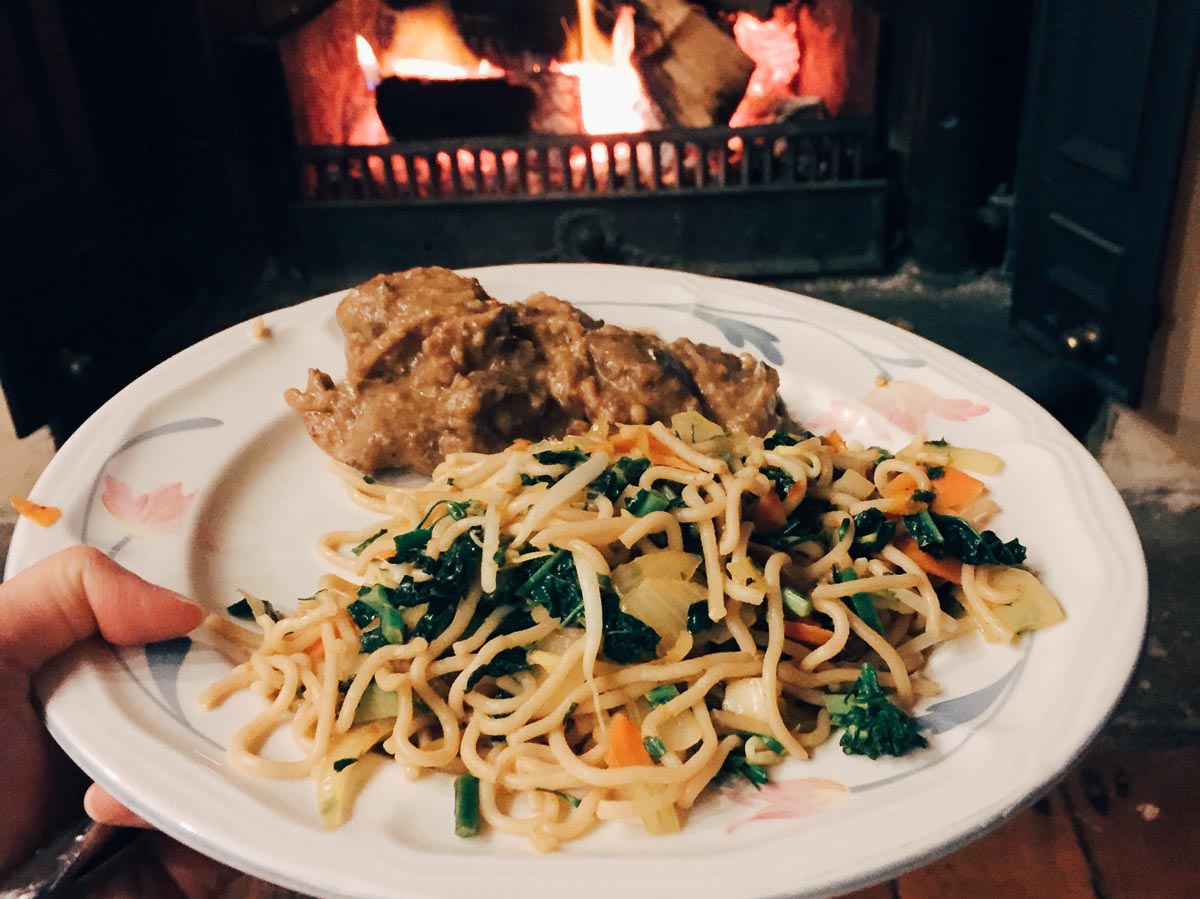 Dinner by the fireplace. Eat what they eat!
Dinner by the fireplace. Eat what they eat!
However, if earning extra cash to fund your travels is what you are looking for and you’re planning to stay in NZ for a longer period of time, say 10 months to a year, maybe getting a paid job would fit your schedule and plans better.
Furthermore, since it’s not paid work, most of the hosts do not see it as a formal exchange of services. It’s simply about getting some help with whatever chores they have and by providing you with food and a place to stay is their way of showing their gratitude. Most of them are very very nice about it and they genuinely feel grateful for your help. And precisely because it is not paid work, working hours are shorter and expectations are lower as well.
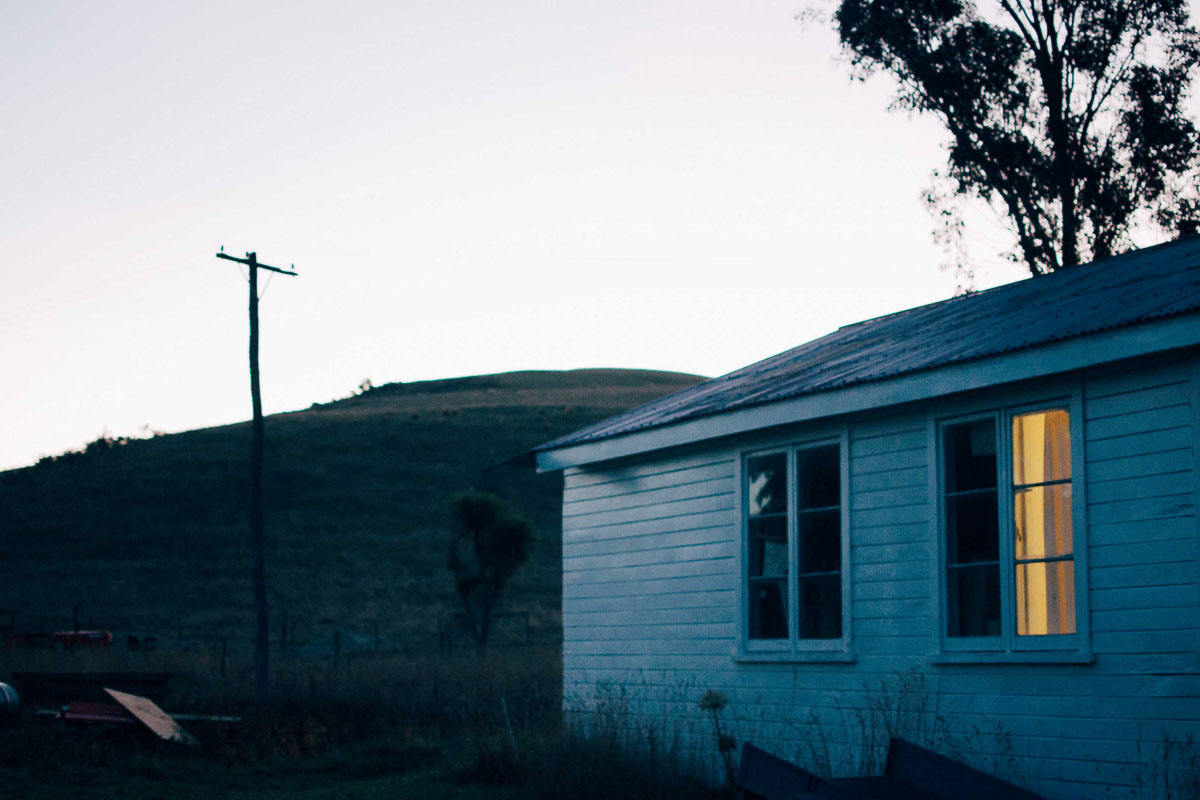
Before you decide yes I want to WWOOF, here are some things you should take note of:
Read reviews! For me, wwoofers’ reviews play a huge part in my decision to work at a particular place. It’s important to know what kind of family you’ll be living with, what kind of environment or what the expectations of the hosts are. Do your own research, read the reviews, check out the location and look at the pictures before contacting your hosts.
A major factor in deciding the farm that I wanted to work at was the location of it. My friend and I didn’t plan to rent a car, thus it was important that the farm was not located at places that are too secluded so that even if the hosts are unable to fetch us to their farm, it wouldn’t be too much of a hassle to travel there. However, lucky for us, both hosts were kind enough to pick us up from where we were and fetched us to their place. The hosts may require you to have your own transportation, as many of them are located at pretty secluded areas.
So be sure to arrange for transportation when you’re planning!
It is not free! You need to pay a fee to become a registered member at WWOOF NZ. Different country’s WWOOF websites have different fees so check them out!
Most hosts only require around 4-6hours of work before you’re free to go wherever or do whatever you please. My hosts were pretty flexible with what time they required us to start. As it was winter and it’s really cold early in the morning, work started at 9am on some days and 10am on others. They would always tell us “If it’s too cold or if it’s raining in the morning when you wake up, just continue sleeping, we’ll start when the rain stops.” This was how relaxed they were. Never in my dreams will this happen in Singapore. They weren’t too particular about the hours as well; it was more like a gauge for them to allocate work. I can’t say that all hosts would be the same but at least for mine, it was as such.
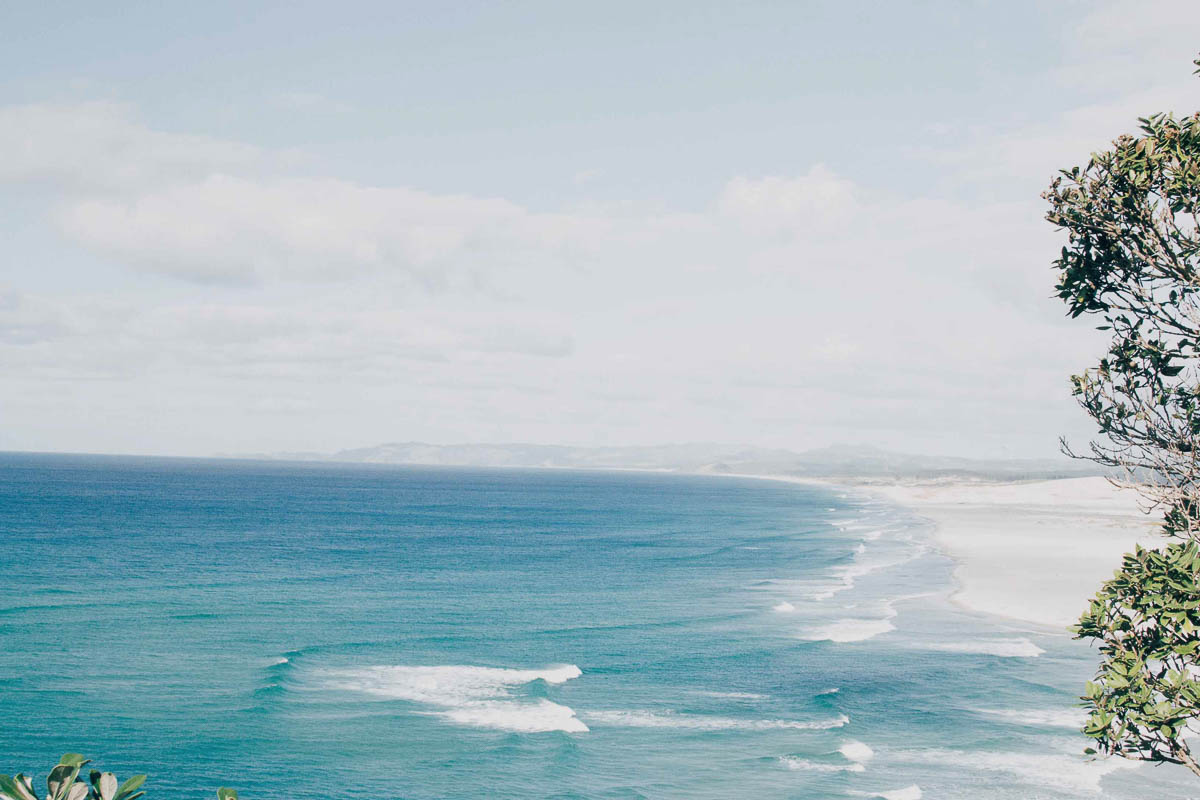
Depending on your tasks, having some prior experience would be good. For example, if you are doing farm work, having experience working in a farm helps or if the place that you are at requires help with scaffolding, having carpentry experience would be good. Some of the hosts require you to have experience, but I guess you can still try your luck if you reallyyyyy want to work at a particular place.
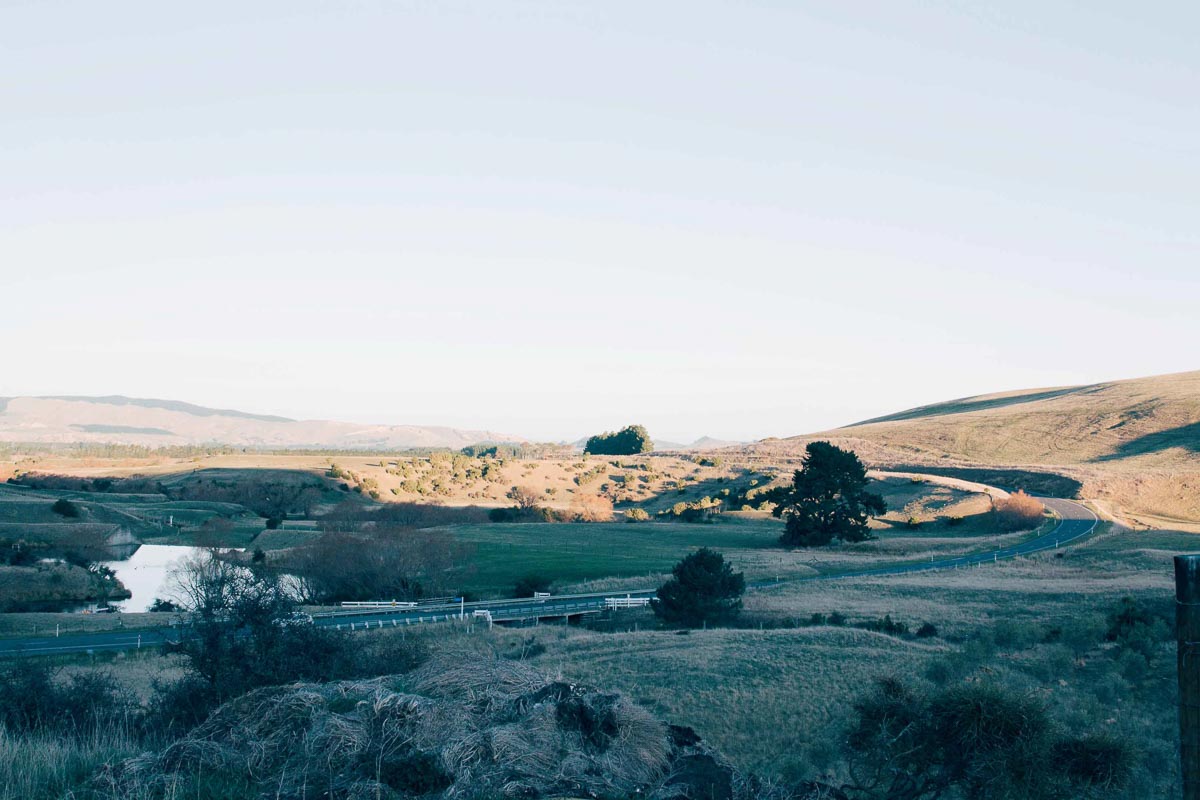
If you’re a WIFI whore, do note that not all farms have WIFI and even if it states that they do, it probably isn’t as fast as what you’re used to in Singapore. So drop your phones, stop looking at your screens and go play with the cows instead.
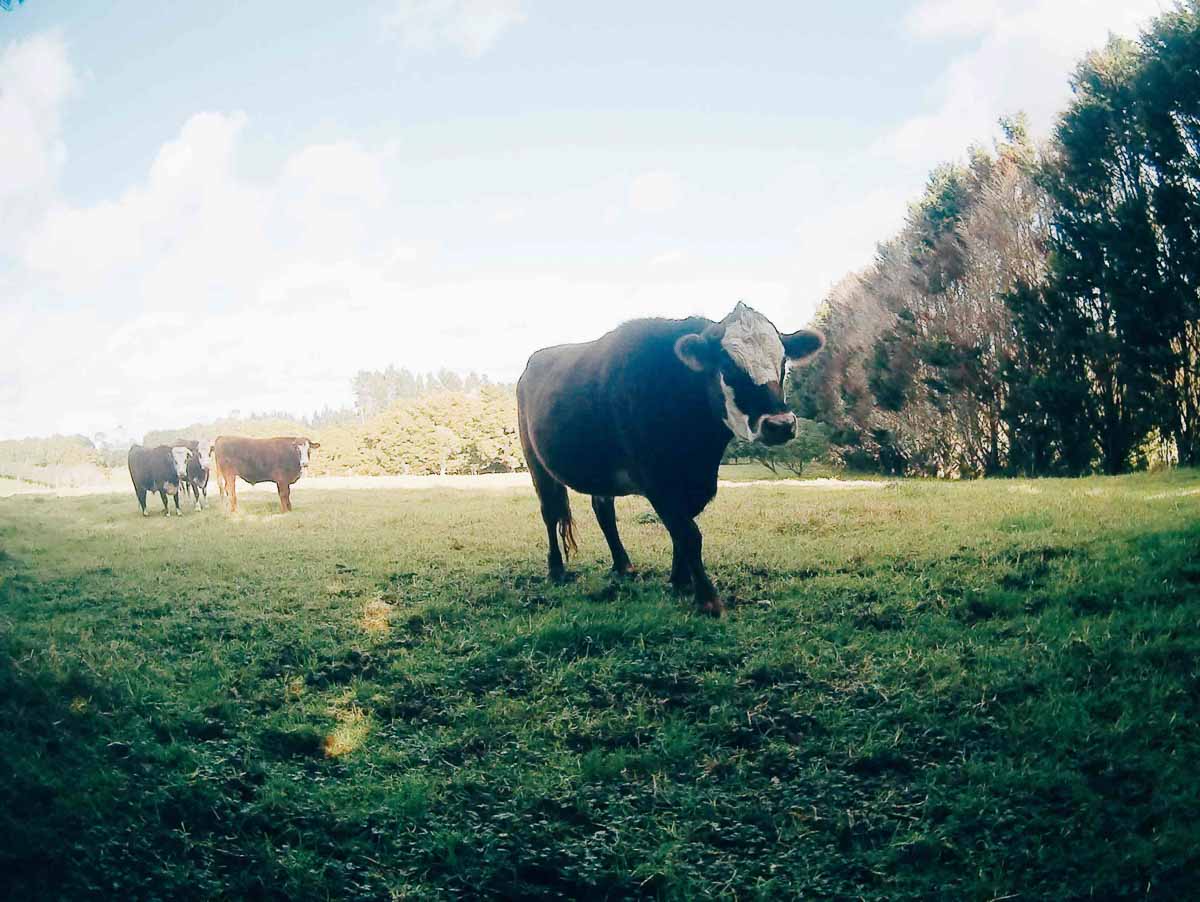
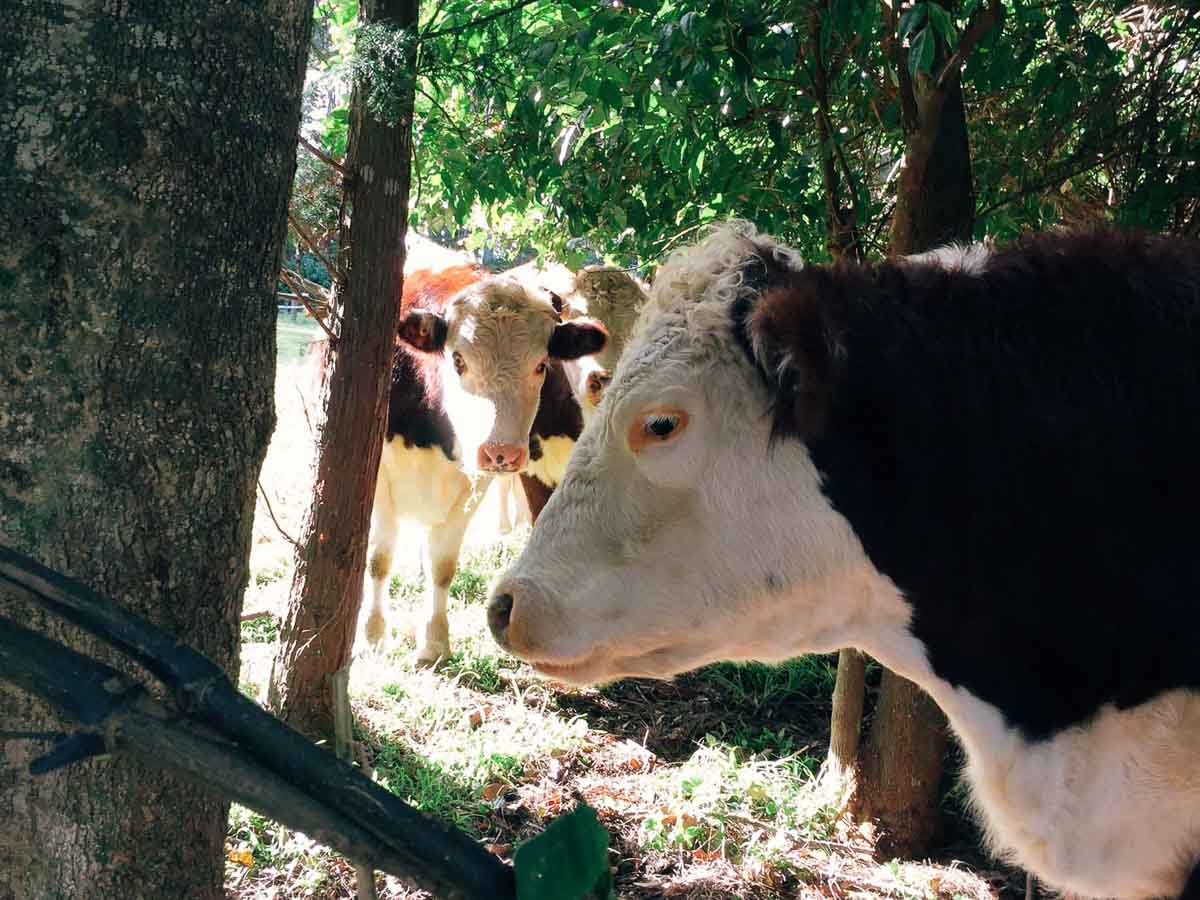
Getting up close and cosy with Mr. Cow.
All in all, just be responsible and not cancel on your hosts last minute as most of them genuinely need help in some way or another. Book and liase with them at an early date as not all of them reply quickly. Most of them took at least one full day to reply, some a few days.
Hope this answered some of your questions about WWOOFing in New Zealand. Now, WWOOF away!
Like what you’re seeing? Share, like, subscribe and follow more of our adventures on Facebook or Instagram!



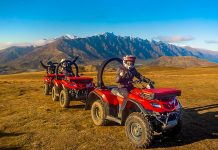










Hi, I’m interested in going WWOOF-ing for the first time this year, and I’m thinking New Zealand would be a great place to start off. May I know some of your top picks for the farms there, and if you chose places that were close to the airport? I’ve been reading some sources on the internet that had stories of negative experiences (hosts overworking the volunteers, bad accommodations, etc) so I thought I’d get some recommendations from someone who’s already been there. Any advice? 🙂
Hi Grace!
I don’t have any top picks for farms as I’ve only been to two and I highly recommend the first farm I went but I believe the owner has already sold his place. He mentioned he wanted to sell his place during my stay as well. As for proximity to airport, I didn’t choose those that are near to the airport because there aren’t many farms located near airports but do check out how you can get there or liase with the owner if they are able to pick you up at the airport or somewhere that you can get to. For mine, I went to WWOOF straight after I landed so the host was kind enough to pick me directly from the airport. I met my second host in central Christchurch and he drove me to his place. Most of the time they are really nice and will be willing to drive you to their farm unless they’ve stated that you must have your own car in their profile.
Protect yourself and your experience by reading their reviews. Get an idea of what they are like and what kind of jobs you’ll be involved in through their reviews. If you aren’t sure about anything,just contact them and ask! 🙂 I’ve also came across negative reviews and was a little wary. Being cautious is good! 🙂 just be honest about what you can do or cannot do. I have zero experience with farming and carpentry and what nots so assuming you’re like me, I believe Farmers who let you WWOOF will not be intending to overwork you or like use you as cheap labour. Haha. They probably need some genuine help and want to let people like us experience farming.
Good luck k! Have fun wwoofing! 🙂 -Jordyn
Thanks for the reply, Jordyn! (Sorry, I just saw this!) I’ve signed up with Helpx, which is pretty much like WWOOF, and have gotten in contact with two hosts with great reviews. I’m pretty excited and hope things work out. One of the hosts mentioned that to do the volunteer work in NZ, I’d have to apply for a Working Holiday Visa, which is only for those 30 and under. It works for me but not my Mum, who might be interested in participating as well. Was wondering if you had to apply for a visa while WWOOF-ing in NZ?
Hi Jordyn
I will be WWOOF-ing in NZ in Feb to Mar 28 ,2017. I am in my 50’s. I understand that Singaporeans can be in NZ for maximum of 3 months without a visa. Do i need to apply for a Working Holiday Visa? Thanks.
Katherine
Hi Katherine,
I don’t think you will need a working holiday visa if you’ll be there for 1-2months! If you plan to stay longer I would suggest you get one. I did not apply for one when I wwoofed there! 🙂 Hope this helps and enjoy NZ!
Jordyn
HI Jordyn
We are planning a WWOOF stay in July in New Zealand, but July is already winter season. Are there any farming work to do in July? We are planning to go with our children who are in primary school, they can offer help. Do you know if there are any host families that welcome children?
Thanks
Lillian
Hi Lillian,
Unfortunately WWOOFing stays change all the time and it may be best to check with WWOOFing directly because we will not have the most current information (we’re not affiliated to them and they don’t release such info to the public).
– Hendric
Hi! Really nice blog post there 🙂 Im planning to go NZ for 1 month and I would like to experience WWOOFing, but do I need a work holiday visa for that? Did the immigrations ask you? Thanks in advance
Hi Nur, I think the good people at WWOOFing will clarify that! The rules may have changed and this experience was written awhile back!
Hi I am going to be traveling alone at the end of summer 2018. Would you recommend WWOOFFing for a solo traveller? It sounds like you had a great experience!
Think most people do it alone! Do read the reviews carefully and follow your gut when you’re there!
Hi, 🙂
I need a little help. My daughter is gong to NZ and Wwoofing. I am a worried mom because the world is beautiful but yet a little scary. She is 20 and applied to Wwoofingg before she starts college She recieved a few offers but I am worried. She is a small girl and how am I sure she will be safe. How will I know how many people are on the farm? I have been reviewing Wwoofing and trying to make sure she is safe. How do I know these places are safe??
There’s no way to be 100% sure that she will be safe but what you and her can do to minimise the risk is to read reviews, see what people say and follow your gut feel. If there are hosts that seem dodgy or does not have any reviews, you might want to steer clear of those and go for more credible ones. Also, you might also want to check out the location of the farm, how secluded it is and whether you will have reception at the farm. If there is a name of the farm you might want to do a quick google search and see if it is a legitimate company/business/farm in NZ as well.
From my experience, Kiwis are very friendly and helpful people and I had many positive encounters with the people in NZ.
However, as much as we would like it to be 100% safe before embarking on a journey, travelling is often about taking a leap of faith!
I hope this helps!